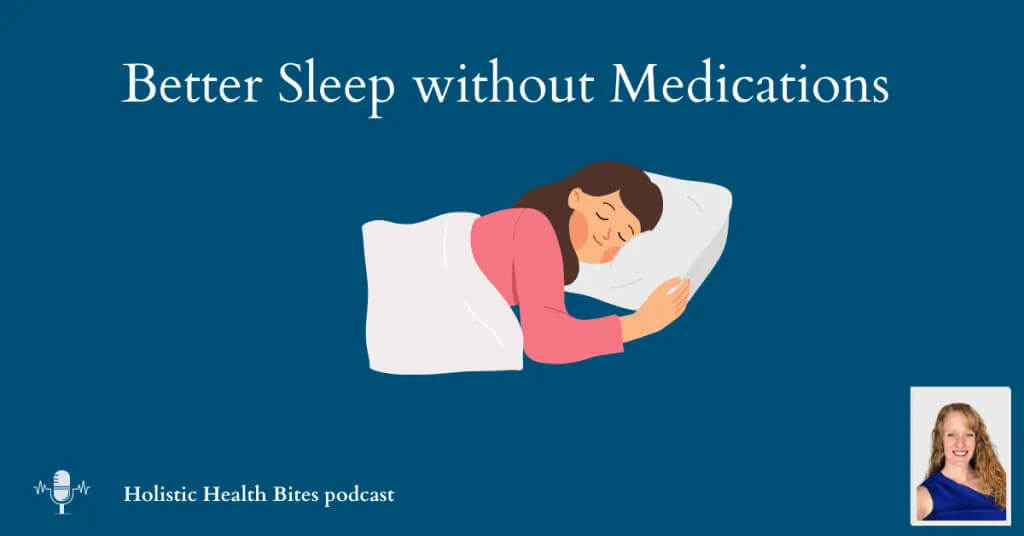
Better Sleep without Medications
Today, we are talking all about how to get better sleep without medications. I’ll be sharing some helpful tips and strategies that you can use to improve your sleep quality naturally.
Why Is Sleep Important
Before we dive into the tips, let’s first discuss the importance of getting quality sleep. Quality sleep is crucial for our overall health and well-being. When we sleep, our bodies and minds are able to recharge, repair, and rejuvenate. Getting enough high-quality sleep is associated with numerous physical and mental health benefits, such as improved immune function, better memory and cognitive performance, and enhanced mood and emotional regulation.
On the other hand, chronic lack of sleep or poor sleep quality can lead to a range of negative health outcomes. For example, studies have shown that inadequate sleep is associated with an increased risk of developing depression, anxiety, and other mood disorders. Additionally, poor sleep has been linked to weight gain and obesity, as it disrupts the hormones that regulate appetite and metabolism.
In short, prioritizing quality sleep is an essential part of a healthy lifestyle. By making sleep a priority and implementing strategies to improve sleep quality, we can reap the many benefits that come with a good night’s rest, both for our physical and mental health.
Sleep Tips
Now, let’s talk about some strategies that you can use to improve your sleep quality.
Sleep Environment
First, creating a sleep-conducive environment is essential for promoting healthy and restful sleep. Your bedroom should be a peaceful and relaxing space that encourages your body and mind to wind down at the end of the day. One of the most important factors in creating a sleep-conducive environment is to ensure that your bedroom is quiet, cool, and dark.
Excessive noise or light can disrupt your sleep and prevent you from entering into the deeper stages of sleep, which are critical for physical and mental restoration. Consider investing in earplugs or a white noise machine to block out any disruptive sounds, and use blackout curtains or an eye mask to keep out light.
In addition to creating a quiet, cool, and dark environment, it’s important to invest in a comfortable mattress and pillow that provide proper support for your body. Your mattress and pillow play a crucial role in supporting your spine and ensuring that your body is in a comfortable and neutral position while you sleep. If your mattress or pillow is old, lumpy, or uncomfortable, it’s time to invest in a new one.
Lastly, make sure that your bedroom is tidy and clutter-free. A clean and organized space can help to reduce stress and promote relaxation, which is essential for falling and staying asleep. By creating a sleep-conducive environment that is quiet, cool, dark, and comfortable, you can set the stage for a restful and rejuvenating night’s sleep.
Sleep Schedule
The second tip is to establish a consistent sleep schedule. Establishing a consistent sleep schedule is one of the most important steps you can take to improve your sleep quality. Our bodies thrive on routine, and by going to bed and waking up at the same time every day, even on weekends, you can help regulate your body’s internal clock, also known as your circadian rhythm.
Your circadian rhythm is a natural, 24-hour cycle that regulates many of your bodily functions, including your sleep-wake cycle. When your circadian rhythm is in sync, you’ll find it easier to fall asleep at night and wake up in the morning feeling refreshed and energized.
On the other hand, when you disrupt your circadian rhythm by staying up late or sleeping in on weekends, it can throw off your body’s natural rhythm and make it harder to fall asleep at night. This can lead to difficulty falling asleep, waking up frequently during the night, and feeling groggy and tired during the day.
To establish a consistent sleep schedule, try to go to bed and wake up at the same time every day, even on weekends. This may take some time to adjust to, especially if you’re used to staying up late or sleeping in on weekends, but it’s worth the effort. Stick with your schedule as much as possible, and if you do need to deviate from it, try to limit the disruption to no more than an hour or two.
By establishing a consistent sleep schedule, you can help regulate your body’s internal clock and promote a healthy sleep-wake cycle, leading to better sleep quality and improved overall health and well-being.
Relaxation Before Bed
The third tip is to practice relaxation techniques before bed. Practicing relaxation techniques before bed is a great way to calm your mind and body, and prepare yourself for a restful night’s sleep. When you’re feeling stressed or anxious, it can be difficult to fall asleep or stay asleep throughout the night. By engaging in relaxation techniques, you can help to reduce stress and anxiety, and promote a sense of calm and relaxation.
Some effective relaxation techniques that you can try before bed include taking a warm bath, practicing yoga or meditation, or reading a book. Taking a warm bath before bed can help to relax your muscles and calm your mind, making it easier to fall asleep. Yoga and meditation are also great options, as they can help to reduce stress and anxiety and promote feelings of relaxation and tranquility. Reading a book is another effective relaxation technique, as it can help to distract your mind from any stressful thoughts or worries, and prepare you for a restful night’s sleep.
Whatever relaxation technique you choose, try to make it a regular part of your bedtime routine. By consistently practicing relaxation techniques before bed, you can train your body to associate these activities with sleep, making it easier to fall asleep and stay asleep throughout the night.
By incorporating relaxation techniques into your evening routine, you can help to reduce stress and anxiety, calm your mind and body, and promote better sleep quality.
Avoid Stimulants
The fourth tip is to avoid stimulants and depressants like caffeine, nicotine, and alcohol before bed is an important step in improving your sleep quality. These substances can interfere with your body’s natural sleep cycle and prevent you from getting the restful sleep your body needs.
Caffeine is a stimulant that is found in many common beverages such as coffee, tea, and soda, as well as some foods like chocolate. Consuming caffeine too close to bedtime can interfere with your ability to fall asleep and stay asleep throughout the night. For most people, it’s best to avoid caffeine for at least 4-6 hours before bed to prevent it from disrupting your sleep.
Nicotine is another stimulant that can interfere with your sleep quality. Many people mistakenly believe that smoking can help them relax and fall asleep, but in reality, nicotine can make it harder to fall asleep and lead to more restless sleep overall. If you’re a smoker, consider quitting or cutting back to improve your sleep quality.
Alcohol is also a substance that can interfere with your sleep quality. While alcohol may seem like it helps you fall asleep faster, it can also disrupt your sleep cycle, leading to more fragmented and less restful sleep. If you choose to drink alcohol, it’s best to do so in moderation and avoid drinking within a few hours of bedtime.
In addition to avoiding these substances before bed, it’s also important to pay attention to your overall diet and nutrition. Eating a balanced diet that is rich in whole foods and low in processed foods and sugar can help to improve your sleep quality and overall health.
By avoiding stimulants like caffeine, nicotine, and alcohol before bed, and focusing on a healthy, balanced diet, you can improve your sleep quality and wake up feeling more rested and refreshed.
Avoid Screens Before Bed
The fifth tip is to limit your exposure to screens, especially in the evening. The blue light emitted by electronic devices, such as phones, laptops, and televisions, can disrupt your body’s natural sleep cycle by suppressing the production of melatonin, a hormone that regulates sleep. This can make it harder to fall asleep and stay asleep throughout the night.
It’s important to limit your exposure to screens, especially in the evening, to promote healthy sleep habits. This means avoiding the use of electronic devices for at least an hour before bed, and ideally longer if possible. Instead, consider engaging in relaxing activities that do not involve screens, such as reading a book, taking a bath, or practicing meditation.
If you must use electronic devices before bed, consider using “night mode” or “dark mode” settings to reduce the amount of blue light emitted by the screen. Some devices also offer “blue light blocking” glasses or screen filters that can help to reduce your exposure to blue light in the evening.
By limiting your exposure to screens before bed and prioritizing healthy sleep habits, you can improve the quality of your sleep and wake up feeling more rested and refreshed.
Get Regular Exercise
The sixth and final tip is to get regular exercise. Regular exercise is a great way to improve your overall health and well-being, and it can also help to improve the quality of your sleep. Exercise has been shown to reduce stress and anxiety, both of which can interfere with your ability to fall asleep and stay asleep throughout the night.
However, it’s important to time your exercise routine carefully to avoid disrupting your sleep. Intense exercise too close to bedtime can increase your heart rate and body temperature, making it harder to fall asleep. For most people, it’s best to avoid vigorous exercise for at least 2-3 hours before bedtime to allow your body to cool down and prepare for sleep.
If you prefer to exercise in the evening, consider engaging in more gentle or relaxing activities, such as yoga or stretching. These activities can help to reduce stress and tension in your body, promoting relaxation and better sleep.
It’s also important to find an exercise routine that works for you and your schedule. Consistency is key when it comes to reaping the benefits of exercise for sleep. Aim for at least 30 minutes of moderate exercise most days of the week to promote better sleep and overall health.
By incorporating regular exercise into your daily routine and prioritizing healthy sleep habits, you can improve the quality of your sleep and wake up feeling more refreshed and energized each day.
Wrap up
These are just a few of the many natural strategies that you can use to improve your sleep quality. By creating a sleep-conducive environment, establishing a consistent sleep schedule, practicing relaxation techniques, avoiding stimulants/depressants and screens before bed, and getting regular exercise, you can promote healthy and restful sleep.
Thank you for listening to the podcast on how to get better sleep without medications. I hope you found these tips helpful. Until the next, be well and vibrant!





















0 Comments